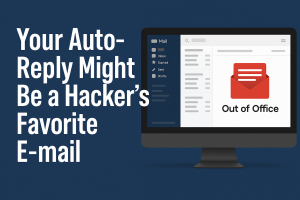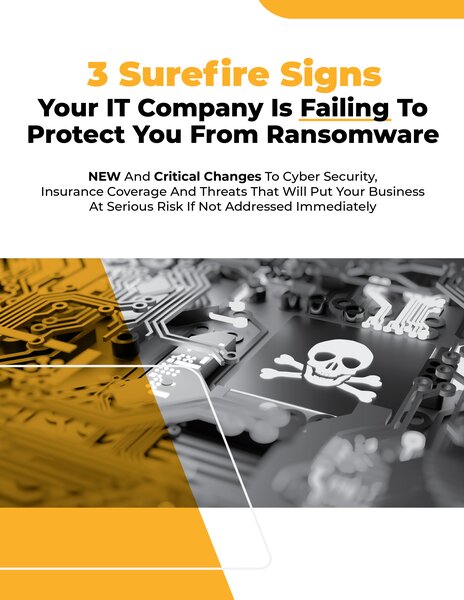 Let’s be real—when you finally step away from the job site, the last thing you want to worry about is cybersecurity.
Let’s be real—when you finally step away from the job site, the last thing you want to worry about is cybersecurity.
You’ve earned that time off. Whether you’re headed to the Gulf Coast for some sun or just taking a long weekend to recharge, your out-of-office reply is doing its job…or so you think.
But here’s the kicker: that harmless auto-reply?
It might be giving hackers exactly what they need to breach your system.
🎯 Why Construction Firms Are Prime Targets
In industries like ours—where field teams rely on mobile connectivity and admin staff are juggling ten things at once—one well-timed phishing e-mail can do serious damage. Especially if your IT lead (maybe that’s you) is out of the office and the backup isn’t trained to spot the red flags.
A typical auto-reply gives away:
- Who’s out and for how long
- Who to contact instead (plus their name and e-mail)
- Internal hierarchy or job responsibilities
- Sometimes even why you're gone (“I’m at the ABC Contractor Conference…”)
For cybercriminals, that’s a blueprint for a Business E-mail Compromise (BEC). All they need is one distracted admin and a convincing spoofed message that says, “Urgent: please wire the deposit to this new account…”
And just like that, a $45,000 “vendor payment” vanishes into thin air.
🧱 How It Plays Out On the Job
Let’s say you’re Alex—Director of IT at a commercial GC in Houston. You’re on PTO, and your auto-reply tells folks to contact your office manager, Maria.
A hacker sees this, spoofs your e-mail address, and sends Maria a “quick request” for a document with subcontractor SSNs.
Maria, stressed and multitasking, sends it.
Now your company’s in breach, the legal team’s involved, and your break turns into a disaster recovery fire drill.
This stuff doesn’t just happen in big tech. It’s hitting construction firms—especially midsize ones—hard.
🔒 What You Can Do (That Actually Works)
You don’t need to cancel your vacation. But you do need to tighten your e-mail settings and update your protocols:
- Keep Auto-Replies Vague
Instead of sharing specifics, try:
“I’m currently out of the office and will reply upon my return. For urgent needs, contact our main office at [main number].”
No names. No trip info. No breadcrumbs.
- Train Your Team (Seriously)
Remind your crew:
- Never act on e-mail-only requests involving money, passwords, or sensitive docs
- Always verify urgent or unusual requests through a second method (like a call or in-person check)
- Use the Tools You’ve Got
If you’re already using Microsoft 365 or Google Workspace, beef up your e-mail security:
- Anti-spoofing and phishing detection
- Domain-level protections
- Alert rules for high-risk keywords like “wire transfer” or “urgent”
- Enable MFA Across the Board
Multifactor authentication should be standard—especially for execs, accounting, and IT admins. If someone steals a password, MFA stops them cold.
- Partner With a Proactive IT Team
A good IT partner doesn’t just fix things when they break. They monitor, flag, and prevent cyberattacks before they land. We’re talking early detection, real-time alerts, and faster response times.
Because downtime? That’s not just annoying. It’s costly.
🧠 Want Peace of Mind While You’re Out of Office?
We help construction firms lock down their systems, so the only surprise you come back to is a clean inbox.
👉 Click here to schedule a free Security Assessment.
We’ll check for hidden vulnerabilities and show you how to patch the cracks in your digital foundation—before a hacker finds them.
Take the break. We’ve got your back.



